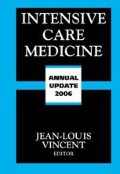Abstract
Aspiration of gastric and oropharyngeal contents is an important clinical cause of acute lung injury (ALI) that has been recognized for more than 50 years. Epidemiologic studies of ALI, as well as clinical trials, have identified aspiration-induced lung injury as one of the major causes of ALI and the acute respiratory distress syndrome (ARDS) [1], [2]. The most important etiological factor for aspiration-related lung injury is a depressed level of consciousness [3]. One group of investigators found that an altered level of consciousness was the major predisposing factor in 68% of cases [4]. Like other clinical disorders that predispose patients to the development of ALI, aspiration of gastric contents may be associated with other clinical risk factors including primary pneumonia, sepsis, hypotension, and drug overdose [2].
Access this chapter
Tax calculation will be finalised at checkout
Purchases are for personal use only
Preview
Unable to display preview. Download preview PDF.
References
Eisner MD, Thompson T, Hudson LD, et al (2001) Efficacy of low tidal volume ventilation in patients with different clinical risk factors for acute lung injury and the acute respiratory distress syndrome. Am J Respir Crit Care Med 64:231–236
Ware LB, Matthay MA (2000) The acute respiratory distress syndrome. N Engl J Med 342:1334–1349
Adnet F, Baud F (1996) Relation between Glasgow Coma Scale and aspiration pneumonia. Lancet 348:123–124
Rebuck JA, Rasmussen JR, Olsen KM (2001) Clinical aspiration-related practice patterns in the intensive care unit: a physician survey. Crit Care Med 29:2239–2244
Folkesson HG, Matthay MA, Hebert CA, Broaddus VC (1995) Acid aspiration-induced lung injury in rabbits is mediated by interleukin-8-dependent mechanisms. J Clin Invest 96:107–116
van Westerloo DJ, Knapp S, van’t Veer C, et al (2005) Aspiration pneumonitis primes the host for an exaggerated inflammatory response during pneumonia. Crit Care Med 33:1770–1778
Matthay MA, Rosen GD (1996) Acid aspiration induced lung injury. New insights and therapeutic options. Am J Respir Crit Care Med 154:277–278
Miller EJ, Cohen AB, Matthay MA (1996) Increased interleukin-8 concentrations in the pulmonary edema fluid of patients with acute respiratory distress syndrome from sepsis. Crit Care Med 24:1448–1455
Pugin J, Verghese G, Widmer MC, Matthay MA (1999) The alveolar space is the site of intense inflammatory and profibrotic reactions in the early phase of acute respiratory distress syndrome. Crit Care Med 27:304–312
Donnelly SC, Strieter RM, Kunkel SL, et al (1993) Interleukin-8 and development of adult respiratory distress syndrome in at-risk patient groups. Lancet 341:643–647
Parsons PE, Eisner MD, Thompson BT, et al (2005) Lower tidal volume ventilation and plasma cytokine markers of inflammation in patients with acute lung injury. Crit Care Med 33:1–6
Modelska K, Pittet JF, Folkesson HG, Courtney Broaddus V, Matthay MA (1999) Acid-induced lung injury. Protective effect of anti-interleukin-8 pretreatment on alveolar epithelial barrier function in rabbits. Am J Respir Crit Care Med 160:1450–1456
Goldman G, Welbourn R, Klausner JM, et al (1991) Neutrophil accumulations due to pulmonary thromboxane synthesis mediate acid aspiration injury. J Appl Physiol 70:1511–1517
Folkesson HG, Matthay MA (1997) Inhibition of CD 18 OR CD 11b attenuates acute lung injury after acid instillation in rabbitS. J Appl Physiol 82:1743–1750
Doerschuk CM (2001) Mechanisms of leukocyte sequestration in inflamed lungs. MicroCirculation 8:71–88
Nagase T, Ohga E, Sudo E, et al (1996) Intercellular adhesion molecule-1 mediates acid aspiration-induced lung injury. Am J Respir Crit Care Med 154:504–510
Safdar Z, Yiming M, Grunig G, Bhattacharya J (2005) Inhibition of acid-induced lung injury by hyperosmolar sucrose. Am J Respir Crit Care Med 172:1002–1007
Ware LB, Matthay MA (2002) Keratinocyte and hepatocyte growth factors in the lung: roles in lung development, inflammation, and repair. Am J Physiol Lung Cell Mol Physiol 282:L924–940
Frank JA, Gutierrez JA, Jones KD, Allen L, Dobbs L, Matthay MA (2002) Low tidal volume reduces epithelial and endothelial injury in acid-injured rat lungs. Am J Respir Crit Care Med 165:242–249
Matthay MA, Ware LB (2004) Can nicotine treat sepsis? Nat Med 10:1161–1162
Su X, Mednick G, Matthay ZA, Uchida T, Matthay MA (2006) Nicotine reduces acid induced lung injury in ice and rats. Expt Biol (abst, in press)
Uchida T, Shirawas M, Ware LB, Hata Y, Machita K, Matthay MA (2006) RAGE is a marker of alveolar epithelial type I cell injury in acute lung injury. Am J Respir Crit Care Med (abst, in press)
McAuley DF, Frank JA, Fang X, Matthay MA (2004) Clinically relevant concentrations of beta2-adrenergic agonists stimulate maximal cyclic adenosine monophosphate-dependent airspace fluid clearance and decrease pulmonary edema in experimental acid-induced lung injury. Crit Care Med 32:1470–1476
The Acute Respiratory Distress Syndrome Network (2001) Efficacy of low tidal volume ventilation in patients with different clinical risk factors for acute lung injury and the acute respiratory distress syndrome. Am J Respir Crit Care Med 64:231–236
Frank JA, Matthay MA (2003) Science review: mechanisms of ventilator-induced injury. Crit Care 7:233–241
Atabai K, Ware LB, Snider ME, et al (2002) Aerosolized β 2-adrenergic agonists achieve therapeutic levels in the pulmonary edema fluid of ventilated patients with acute respiratory failure. Intensive Care Med 28:705–711
Author information
Authors and Affiliations
Editor information
Editors and Affiliations
Rights and permissions
Copyright information
© 2006 Springer Science + Business Media Inc.
About this paper
Cite this paper
Matthay, M.A., Mednick, G., Matthay, Z.A. (2006). Aspiration-induced Lung Injury: Experimental and Human Studies. In: Vincent, JL. (eds) Intensive Care Medicine. Springer, New York, NY. https://doi.org/10.1007/0-387-35096-9_33
Download citation
DOI: https://doi.org/10.1007/0-387-35096-9_33
Publisher Name: Springer, New York, NY
Print ISBN: 978-0-387-30156-3
Online ISBN: 978-0-387-35096-7
eBook Packages: MedicineMedicine (R0)

